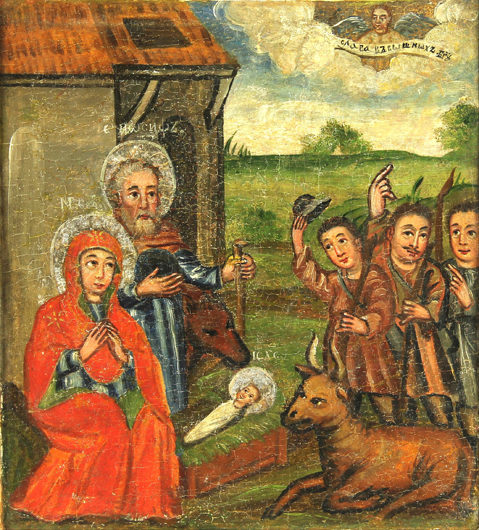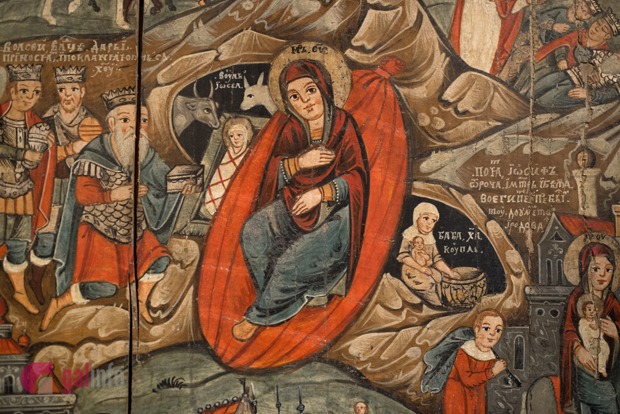“And there were shepherds residing in the fields nearby, keeping watch over their flocks by night. Just then an angel of the Lord stood before them, and the glory of the Lord shone around them, and they were terrified. But the angel said to them, “Do not be afraid! For behold, I bring you good news of great joy that will be for all the people: Today in the city of David a Saviour has been born to you. He is Christ the Lord! And this will be a sign to you: You will find a baby wrapped in swaddling cloths and lying in a manger. And suddenly there appeared with the angel a great multitude of the heavenly host, praising God and saying:
 “Glory to God in the highest, and on earth peace to men on whom His favour rests!”
“Glory to God in the highest, and on earth peace to men on whom His favour rests!”
When the angels had left them and gone into heaven, the shepherds said to one another, “Let us go to Bethlehem and see this thing that has happened, which the Lord has made known to us.”
So they hurried off and found Mary and Joseph and the Baby, who was lying in the manger. After they had seen the Child, they spread the message they had received about Him. And all who heard it were amazed at what the shepherds said to them. But Mary treasured up all these things and pondered them in her heart.
The shepherds returned, glorifying and praising God for all they had heard and seen, which was just as the angel had told them.”
(Matthew 1: 8-20)

Dear brothers and sisters, greetings for the feast of the Nativity of our Lord, and God, and Saviour, Jesus Christ, and His wonderful coming to dwell among us in the flesh.
As we celebrate His birth, we again hear the song of the angels, coming to the shepherds in the darkness of night, “Glory to God in the highest, and on earth peace, goodwill among men.”
Peace on earth is the ardent prayer and dream of so many Christians as they celebrate the birth of the King of Peace in a world so beset by darkness, uncertainty and terror: in war-torn Ukraine, where the Church also faces spiritual war; in bombarded, flattened and starved Gaza, and in other parts of the occupied Palestinian territories; in suffering Kosovo-Metochia, where Orthodox Serbs still face discrimination, persecution, uncertainty, violence and even death – never knowing what tomorrow will bring; in Africa, where Christians are routinely kidnapped, tortured or killed, churches set ablaze and their homes, businesses and schools ransacked. The homicidal rage of Herod is a reality Christians in all of these suffering places know and understand.
The world is dark and desperate for peace, but this peace will not come around negotiating-tables in the United Nations, or from governments whose geo-political strategies, economic goals and foreign policy precipitates, supports and maintains armed conflict in their own national interests.
No! True peace cannot and does not come from politicians, governments, military commanders and international-agencies.
This peace will only come when the “peace from above” enters the hearts of men and women, high and low, powerful and powerless.
How and whether this can ever happen in a world so set against God, the message of the Gospel, Faith and Truth is a mystery beyond us, and not a seemingly believable prospect, but as we celebrate the feast of the Nativity, we should each be challenging ourselves to be peace-makers, knowing that the Lord promises beatitude to those who strive for peace:
“Blessed are the peace-makers; for they shall be called the children of God.”
We see the horrors of war and we grow indignant at the actions of governments and their armed forces, and yet if we honestly examine our own hearts and minds, the anger, rage and destructive potential tearing the world apart is also with in us.
We harbour resentment, intolerance, jealousy, anger, argumentativeness and so many dark and destructive passions and powers within us, with the alarming potential to destroy and sow seeds of pain and sorrow.
We harbour grudges, we remember past arguments and wrongs, we refuse to forgive, we remind ourselves of the past actions, words, and intentions of others. We cause division; maintain divisions that already exist; we militate against the very peace that we are called to make and maintain.
We too hurt people; we also do destructive things, even if only on an emotional or relationship level; we too bring distress and pain to other human beings – often those who are closest to us; we too seek to conquer, dominate and rule at the expense of others; we too seek to supersede rivals and to be the victor – making decisions, calling the shots, being in control, having the last word; we too pick arguments, precipitate conflict, argument and cause rivalries and division.
As people who chant about being peace-makers, on our individual, localised, human level, we are agents of conflict and division, who yet have the audacity to come to the services of the Church, and begin worship with the challenging words of the Great Litany: “In peace, let us pray to the Lord…”
At this glorious feast, even as we hear the song of the angels, do we come to celebrate the Nativity as peace-makers?
Do we come with peace in our hearts – at at peace with God, at peace with our own consciences, at peace with the Church, before we even begin to talk about peace with other human beings and ask for peace for the world?
As we come to the Saviour’s birth, we are challenged to examine our own hearts, and ask whether they are places of peace.
How can God come and dwell in us, and our hearts become the spiritual-manger and dwelling place of the Prince of Peace if they are filled with jealousies, divisiveness, anger and a mirror of the divisions of the world?
Christmas must be a reminder that the coming of Christ into His world is an perpetually-unfolding reality, and that each of us must become Christ-Bearers, with the Saviour within us, as lowly, humble and decrepit as we are in the weakness of our humanity: the very same humanity that He put on in the Incarnation.
And… if we are to claim, with any real conviction that we are Christ-bearers, then we must also be peace-bearers, battling with ourselves to banish all that makes for division and conflict, so that we may then become peace-makers, knowing that Christ does not dwell in lives where peace is refused and rejected.
Then, though we may not put an end to wars and international conflict, at the lowliest and most basic human level, we will be changing the world, and bringing peace, and that peace will not be the fragile, often-failing worldly peace – which is often only a lull between conflicts – but the “peace from above”, which is the peace of Christ, which will only know its fullness in the reality of the new heaven and the new earth, where
“The wolf shall live with the lamb, the leopard shall lie down with the kid, the calf and the lion and the fatling together, and a little child shall lead them. The cow and the bear shall graze, their young shall lie down together; and the lion shall eat straw like the ox. The nursing child shall play over the hole of the asp, and the weaned child shall put its hand on the adder’s den.”
(Isaiah 11:6-8)
But though the fullness of the Peace of Christ will only be known in the eternity of Kingdom, we must still labour for it now, even as we now labour for the Kingdom itself.
Through the peace and light of the new-born Saviour, the people who sit in great darkness may still see a great Light, even though the world still does not comprehend it, or even want it, and when individual human hearts become the dwelling of the Prince of Peace, and when individual human lives labour for peace, then the Light of Christ begins to break through the darkness.
Flame by flame, the radiance of Christ’s birth in each of us will then begin to bring light to those in darkness, hope to the hopeless, love to the unloved, comfort to those in distress and sorrow, calm those in turmoil, soothing those in pain and warming cold and frozen hearts.
Hearkening to the message of the angels, let each of us struggle to make ourselves worthy dwellings for the Prince of Peace, so that the message of His Gospel may be realised in our lives, and through us may touch others, so that the message of the angels in the darkness of the first Christmas night may be felt by those in our suffering and war torn world.
May we always struggle be people of the goodwill – blagovolenie – of which the angels sing, and in Christlike love, may Christ live in us, love through us, work through us, and shine through us as the Light of the World.
And, like the shepherds, let us spread the message, glorifying and praising God.
“Glory to God in the highest, and on earth peace! Today Bethlehem receiveth Him Who is ever seated with the Father. Today the angels glorify as God the Babe Who was born. Glory to God in the highest, and on earth peace, good will among men!”
Wishing you a happy, holy, and blessed feast of the Nativity and the blessing of the King of Peace.
In Christ – Hieromonk Mark
